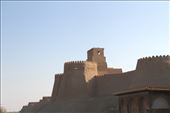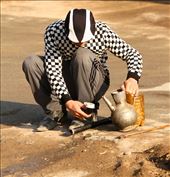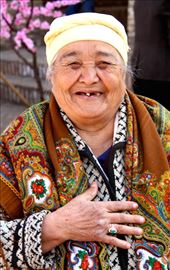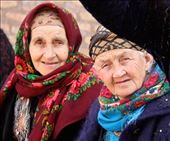THE HISTORY OF KHIVA MAY WELL GO BACK TO NOAH’S flood when legend says it was founded by his son, Shem. What remains of the double-walled city today is more recent, mostly from the 18th Century. Khiva is so well preserved that critics call it a lifeless “museum city.” Try telling that to the 3000 locals who live within the city walls and the thousands more who joined in today’s Navruz celebration.


West Wall Unfinished minaret


Caffeine fix Ready for work
Asia Hotel is just outside the South Gate so we sneaked a peak as the sun set on the mosques and minarets last night. Getting lost was a distinct possibility in the narrow twisting alleyways but we managed to keep the towering Kalta Minor Minaret in sight and found our way home.

Smiles and Tiles
Saida, our guide for the day, met us at nine sharp and showed us hidden Khiva. We slipped away from squares packed with Navruz celebrants to deserted mosques, mausoleums and madrasses. She showed us silk-weavers, wood-carvers and young women practicing the Uzbek art of embroidery. Saida’s English is very good but she speaks as fast as a New Yorker so much of the significance of what she said (as well as all of the unfamiliar names) flew right by me. Suffice to say that Khiva was on a branch of the Silk Road but its main product was slaves, not silk. Over the years it was besieged by rival states and the Persians before finally surrendering to the Russians where it became the other USSR — the Uzbekistan Soviet Socialist Republic.


All Smiles It's your move


Old Friends Pretty in Pink
As interesting as all this history was, I was distracted by the sounds and smells and colors of the Navruz goings-on. The celebration of the spring equinox is a big deal in Central Asia, and everyone got in the swing of things. Old woman in traditional dress pressed strange food on us while style-conscious young women strutted their stuff on teetering high-heels. Young boys squirmed in their best suits while their little sisters glowed like spring flowers in colorful costumes. After six hours of sensory overload and sore feet we cried “Uncle” and shuffled back to the hotel.